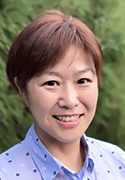 The MBM Program continues its Frontiers in Miniature Brain Machinery lecture series with Kyung Sung. Sung is a Principal Investigator in the Cellular and Tissue Therapies Branch, Division of Cellular and Gene Therapies in the Office of Tissues and Advanced Therapies at the US Food & Drug Administration (FDA).
The MBM Program continues its Frontiers in Miniature Brain Machinery lecture series with Kyung Sung. Sung is a Principal Investigator in the Cellular and Tissue Therapies Branch, Division of Cellular and Gene Therapies in the Office of Tissues and Advanced Therapies at the US Food & Drug Administration (FDA).
Sung will speak November 13 at 4pm in 2269 Beckman Institute on “Regulatory science insights into cell-based products and practical microscale technologies for their assessment.” The lecture is open to the public.
Abstract:
As described in the 21st Century Cures Act, products eligible for Regenerative Medicine Advanced Therapy (RMAT) designation include cellular therapies, therapeutic tissue engineered products, human cell and tissue products, or any combination of products that use such therapies or products. Multipotent stromal cells (MSCs) and induced Pluripotent Stem Cells (iPSCs) have been popular sources for manufacturing RMAT products due to their ability to undergo lineage-specific differentiation.
Despite great promise, successful clinical translation of such cell-based products is often hindered by manufacturing challenges and the lack of reliable markers that can predict the products’ in vivo performance. For instance, MSCs are very heterogeneous and responsive to their surrounding environment, resulting in distinct subpopulations of cells with potentially different amounts of qualities needed for product potency.
Since there are numerous biochemical and biomechanical factors regulating the functions of MSCs, it is critical to develop reliable high-throughput assays that enable the efficient exploration of large and complex parameter spaces for evaluating cellular function. Microscale in vitro systems offer the practicality to fulfill this unmet need. Several simple microfluidic channel arrays have been successfully implemented in screening the influence of paracrine mediators and various tissue microenvironment components in the regulation of cellular functions. In addition, microphysiological three-dimensional organoids and tissue-like structures such as chondrogenic cell aggregates and blood vessels have been incorporated into high-throughput, cell-based screening platforms in efforts to provide functionally relevant in vivo-like conditions.
This presentation will give an overview of practical microscale technologies that are simple to operate while enhancing throughput, relevance, and reliability. How such technologies could be employed in the assessment of cell-based products will be discussed.
Bio:
Kyung Sung’s research focuses on developing new quantitative assays using microscale tools to understand cell-biomaterials interactions and to explore cell behavior in various tissue microenvironmental conditions.
She received her PhD in Chemical Engineering from the University of Michigan, Ann Arbor and did her postdoctoral training at the University of Wisconsin, Madison. She also worked as a patent examiner in Biotechnology at the US Patent and Trademark Office before she joined the FDA in 2015.

